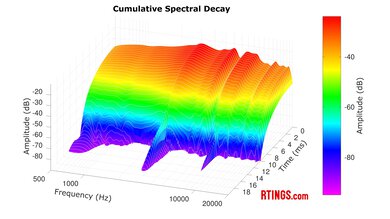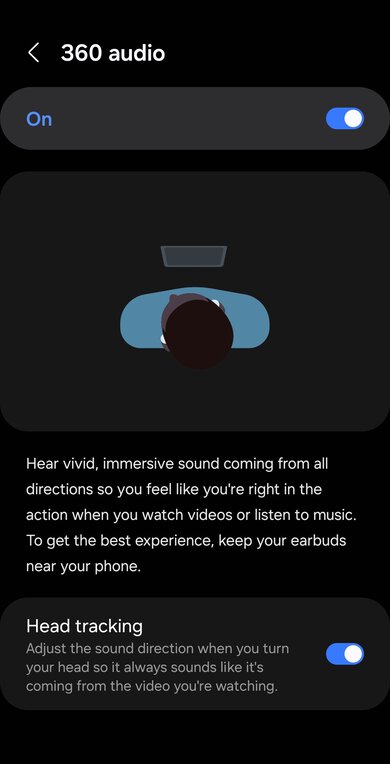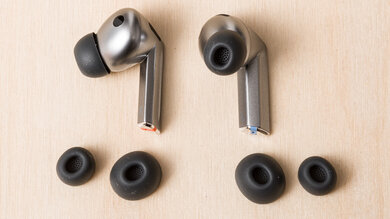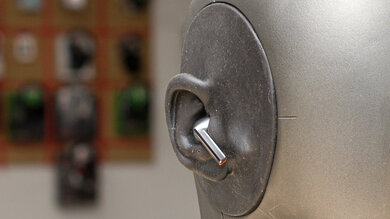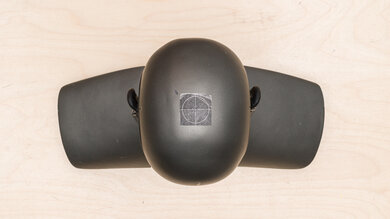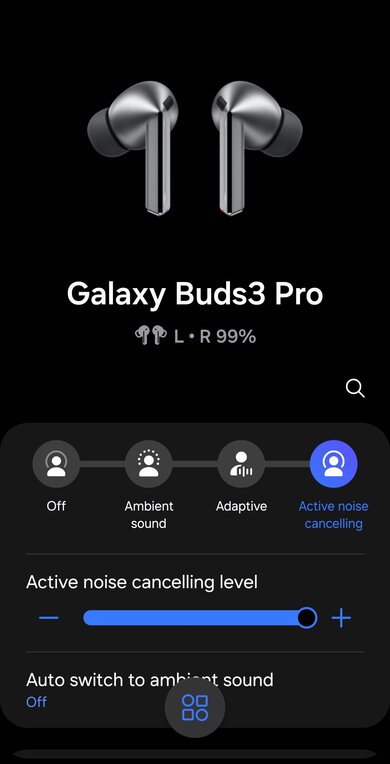The Samsung Galaxy Buds3 Pro are the 2024 follow-up to the previous Samsung Galaxy Buds2 Pro , as the brand's top-of-the-line buds are mainly aimed at the Android and Samsung ecosystem. Packed with adjustable active noise cancelling (ANC) and an upgraded nine-band graphic equalizer, alongside nice-to-haves such as 360 Audio and seamless device switching available, let's check these buds out.
Our Verdict
The Samsung Galaxy Buds3 Pro are good for sports and fitness. They're comfortable, portable, and lightweight. Their IP57 rating is reassuring for dusty and wet conditions. Although they lack stabilizers or over-ear hooks, their stability is still good unless your ears are difficult to fit. Depending on your tastes, their bassy sound signature can also be adjusted using the app's EQ. If you want to block out gym racket, the ANC attenuates a remarkable amount of background noise, or switch to transparency mode when on an outdoor run.
-
Nine-band graphic EQ.
-
Outstanding noise isolation.
-
IP57 rating.
-
Comfortable and stable fit.
-
Access to full features is limited to the brand's ecosystem.
-
Continuous battery life is okay, but not very long-lasting.
The Samsung Galaxy Buds3 Pro are great for traveling. They're portable and comfortable to wear. The buds come equipped with fantastic ANC and passive isolation to block out airplane cabin din and passenger chit-chat. Their app includes an EQ with intuitive controls for easily adjusting the bassy tuning and handling playback. However, for long international flights, the battery life might not last without a recharge in the case to top it up.
-
Nine-band graphic EQ.
-
Outstanding noise isolation.
-
IP57 rating.
-
Comfortable and stable fit.
-
Access to full features is limited to the brand's ecosystem.
-
Lacks standard multi-device pairing.
-
Continuous battery life is okay, but not very long-lasting.
The Samsung Galaxy Buds3 Pro are good for office work. Their ANC handily cancels low-pitched noises like HVACs, as well as higher-pitched keyboard clatter and voices. They feel comfortable and lightweight, and the controls are easy to master. You can EQ the bassy tuning to your tastes as well. While the mic sounds decent, it struggles to separate your voice from noises in your environment. The continuous battery life won't make it through a full workday without a recharge in the case.
-
Nine-band graphic EQ.
-
Outstanding noise isolation.
-
Windows app can be used to control the buds at work.
-
Comfortable and stable fit.
-
Mic's recording quality is decent in quiet environments.
-
Access to full features is limited to the brand's ecosystem.
-
Lacks standard multi-device pairing.
-
Mic has poor noise handling.
-
Continuous battery life is okay, but not very long-lasting.
The Samsung Galaxy Buds3 Pro are Bluetooth-only, so they're limited when it comes to their connectivity for wireless gaming, and their latency is elevated, so you may experience A/V sync issues. That said, you can use the Game Mode in the app with compatible devices.
The Samsung Galaxy Buds3 Pro are wireless-only earbuds and can't be used for wired gaming.
The Samsung Galaxy Buds3 Pro have good audio reproduction accuracy. Their sound profile is quite bass-heavy, so it doesn't follow our target perfectly. However, the mids are rather flat and clear, while the treble region is mostly warm; it's not overly exaggerated, with only minor peaks and dips. You can also use their EQ to change the tuning to taste. Their low harmonic distortion ensures clean audio reproduction. The left and right drivers are amazingly well aligned, so sounds are well-positioned in the stereo field. But the group delay performance is disappointing in the low bass, making sounds like 808 kick drums feel tubby.
The Samsung Galaxy Buds3 Pro have exceptional noise isolation performance. Their combined ANC and passive isolation filter out deep rumbles from bus engines, background conversation, and shrill noises really well. They also don't leak much of your audio, so you won't bother people nearby.
The Samsung Galaxy Buds3 Pro are sub-par for microphone performance. While their recording quality is decent and captures your voice sounding fairly natural, their built-in noise handling struggles to parse your voice from background sounds. In quiet spaces, though, the mic's performance is useable.
The Samsung Galaxy Buds3 Pro have excellent frequency response consistency. Once you get a good fit, you'll get consistent sound with each wear.
- 7.7 Sports And Fitness
- 8.3 Travel
- 7.6 Office Work
- 5.7 Wireless Gaming (In Development)
- 5.5 Wired Gaming (In Development)
Performance Usages
- 7.5 Audio Reproduction Accuracy
- 9.2 Noise Isolation
- 5.9 Microphone (In Development)
- 8.6 Frequency Response Consistency
Changelog
-
Updated Apr 29, 2025:
We've updated the review after investigating Noise Handling on phone calls and Hearing Enhancement features in the companion app .
-
Updated Apr 25, 2025:
This review has been updated to Test Bench 2.0, which adds the following tests: Stereo Mismatch , Group Delay , Cumulative Spectral Decay , PRTF , Harmonic Distortion , and Electrical Aspects . We've added new performance usages and updated the text throughout the Sound tests.
- Updated Apr 25, 2025: We've converted this review to Test Bench 2.0, which updates our sound tests and adds performance usages. You can read more about this in our changelog .
-
Updated Jan 27, 2025:
We now mention the Google Pixel Buds Pro 2 Truly Wireless in the Bluetooth Connection section of this review.
- Updated Dec 06, 2024: Review published.
Differences Between Sizes And Variants
The Samsung Galaxy Buds 3 Pro are available in two colors, 'White' and 'Silver.' Our unit is 'Silver,' and you can view the label . We expect both color variants to perform similarly.
If you encounter another variant of these headphones, please let us know in the forums, and we'll update our review.
Compared To Other Headphones
The Samsung Galaxy Buds 3 Pro are different in form and materials than the previous Samsung Galaxy Buds2 Pro , with the Galaxy Buds 3 Pro more closely resembling the Apple AirPods Pro (2nd generation) than the stemless Galaxy Buds2 Pro . Both the Galaxy Buds2 Pro and Galaxy Buds 3 Pro are noise cancelling with access to the same app, but many features are dependent on you using not only an Android but one of the latest Samsung devices. These days, when you choose Bluetooth earbuds, you're often also choosing operating systems and brand allegiances. Features such as the Samsung Seamless Codec promising 24-bit audio streaming and the ability to switch between devices signed into the same Samsung account require you to buy into the company's ecosystem. Sitting in the tier below, Samsung Galaxy Buds3 arrive equipped with ANC, but they sit outside of your ear canal, so they don't isolate nearly as well as the Galaxy Buds 3 Pro . Similarly, to get the most out of them, you'll need a compatible Samsung device.
For more recommendations, check out the best wireless earbuds for Android , the best sounding wireless earbuds , and the best noise cancelling earbuds .
The Bose QuietComfort Ultra Earbuds Truly Wireless and Samsung Galaxy Buds3 Pro have different strengths that appeal to different people. The Bose's app works on Android/iOS and their battery life is slightly longer. They also have multi-device pairing with up to two devices and use aptX Adaptive alongside other high-quality codecs. The Samsung have a more in-depth equalizer, but it's limited to Android. Many of their features are restricted to Android or Samsung devices, such as the Samsung Seamless Codec and seamless device switching between devices signed into the same account. That said, their noise cancelling is a bit more powerful than the Bose's, which may edge them ahead.
Whether you prefer the Sony WF-1000XM5 Truly Wireless over the Samsung Galaxy Buds3 Pro may largely depend on your device's ecosystem. Both have warm sound profiles by default with in-app EQ. The Sony work the same with Android and iOS devices and have a longer battery life. They have multi-device pairing with up to two devices, too. On the other hand, if you're a Samsung user, you can seamlessly switch between different devices on the same Samsung account. Their mic also sounds more natural, and their IP57 rating outdoes the Sony's IPX4 rating. Finally, the Samsung also boast slightly better noise isolation overall, even if the Sony block bright sounds better.
The main factor in deciding between the Apple AirPods Pro (2nd generation) and Samsung Galaxy Buds3 Pro is which operating system your device uses. Both exhibit fantastic noise isolation performance that goes toe-to-toe. The Apple have a less exaggerated bass response and fewer custom tools with a lower IP54 rating. Meanwhile, the Samsung sound bassier with more user control over the frequency response and a better IP57 rating. All that said, most features like device switching, firmware updates, and app support are limited to your device.
The Samsung Galaxy Buds3 Pro outperform the Samsung Galaxy Buds2 Pro by most metrics. The Galaxy Buds3 Pro have outstanding noise cancelling and a better battery life with added dust resistance. On the other hand, the Galaxy Buds2 Pro use the same app with slightly pared-back functionality, but the main difference is whether you prefer their bud shape and clamshell-style case to the stemmed design of the successor.
The Samsung Galaxy Buds3 Pro have similar features and performance to the Google Pixel Buds Pro 2 . They're both Android-focused products with semi-closed ecosystem support. Both support seamless device switching but require you to log into a Samsung or Google account for the Galaxy Buds3 Pro and Pixel Buds Pro 2 , respectively. The Samsung earbuds support a proprietary Hi-Res audio codec Samsung Seamless Codec, which only works on supported Samsung devices, whereas the Pixel have a low-latency mode that only works on Pixel 8 or newer phones. While both earbuds offer ecosystem-agnostic features—such as the Samsung app's virtual soundstage and the Google earbuds' multi-device pairing—compatibility with your current or future devices will ultimately determine which works best for you.
Video
Test Results
The Samsung Galaxy Buds 3 Pro use planar tweeters and dual amp drivers, which is a departure from the dynamic drivers in the manufacturer's previous releases. By default, with ANC on, their sound profile is warm and bass-heavy.
When you disable the ANC, the frequency response changes with a bit less boom in the bass and a very slightly warmer top-end, but it's a somewhat subtle difference. In addition to the custom graphic equalizer, you can choose from several EQ presets . Broadly, they're all quite bassy, so you'll need to use the custom EQ if you prefer a more conservative, low-end response. However, if you like the extra bass and want more or less treble, the presets are handy for gaining a more excited or warmer voice without much fuss.
In addition to the EQ, select Samsung devices (such as the Samsung Galaxy S22, Samsung Galaxy Flip 4, or newer) support Galaxy AI, which generates an Adaptive EQ based on real-time analysis of your fit and listening habits. Subjectively, we didn't notice a significant difference, but your experience may vary as the algorithm collects more data about your usage.
The Samsung Galaxy Buds 3 Pro have excellent frequency response consistency. Once you find the right-sized ear tips, they sound virtually the same between wears.
Their bass profile's target compliance is decent. The range is exaggerated with a tilt that highlights the low-bass, adding rumble you can feel. On tracks like One To Another by The Charlatans, the boom and punch of the kick drum, low toms, and bass guitar sound prominent, but the region's emphasis can make the keys in the mid-range difficult to make out perfectly.
The Samsung Buds 3 Pro 's mid-range target compliance is outstanding. For the most part, the response closely adheres to our target for present and balanced speech and melodic lead guitar and keys. The elevated bass region carries on into the low-mids, which tapers off in the center of the mid-range, so bass guitar harmonics, for instance, can clutter busy tracks a little, relative to natural-sounding leads.
The Samsung Galaxy Buds 3 Pro have superb treble profile target compliance. Compared to our target, most of the treble range is underemphasized, imparting an overall somewhat warm tonality, which is great if you're sensitive to treble. The low-treble diminishes the articulation of acoustic guitar strings slightly. The soft peaks and narrow dips in the mid-treble and above lend cymbals presence without sounding piercing, but depending on the pitch, they can sound slightly dull.
Their peaks and dips performance is great. The bass and mid ranges are smooth for an even low-end punch relative to the natural-sounding melodies and speech. A small peak and dip in the low-treble adds a little emphasis to vocals or slightly weakens their comprehensibility, depending on the pitch. In the mid-treble, the peaks, which are more obvious in the right driver of our unit, cause sibilants to sound overly bright, especially compared to the narrow dip that can cause vocals to sound a little lispy. You may notice an airy top end depending on how sensitive your hearing is to high frequencies.
The earbuds' L/R drivers are well-matched, and their weighted amplitude is tightly matched. Overall, the frequency response is matched except for a difference in the treble range, which sees a boost to some frequencies more in the right driver than in the left. There's also a phase mismatch in the treble range, which is associated with cancelling out certain frequencies. However, your experience may vary as to whether you'll notice this with real-world content.
These earbuds have disappointing group delay. Both L/R drivers exhibit a delay that can translate to messy low-bass frequencies. However, the upper bass frequencies through the treble are much tighter and transparent.
These buds don't interact with your outer ear, which limits their ability to create a more immersive speaker-like listening experience.
These have excellent harmonic distortion performance. At 94 dB/SPL and 104 dB/SPL, each frequency tested demonstrate low harmonic distortion, ensuring a pure and clean signal.
These Bluetooth earbuds don't need an additional amp to drive them.
You can access the virtual sound feature via the Samsung Galaxy Wearable app. There's a fixed 360 Audio mode that doesn't alter the panning when you move and a head-tracking mode that moves around you when you shift. Overall, the function works as intended by creating a more immersive and spacious soundstage, but it can sound artificial like other virtual surround sound effects. With the head-tracking mode enabled, if you move beyond a 90-degree turn, it'll mute the opposite earbud after shifting the rest of the audio to one side. It also doesn't change much if you nod your head up or down on a vertical plane.
If you own a compatible Samsung TV, you can connect the earbuds and utilize the 360 Audio with (or without) head-tracking by using the TV's settings . During testing, we streamed Netflix and YouTube on the Samsung QN900D 8k QLED TV and didn't notice much difference in the earbuds' sound with 360 Audio on/off and with or without head-tracking. There weren't any latency issues, though.
These are the settings used to test the Samsung Buds 3 Pro Truly Wireless . Our results are only valid when used in this configuration.
The Samsung Galaxy Buds 3 Pro are a stemmed set of earbuds, which is a departure from the previous Samsung Galaxy Buds2 Pro True Wireless' stem-free shape. Available in 'Silver' or 'White,' the Galaxy Buds 3 Pro finish has a semi-metallic sheen to the plastic, with a blue marking on the bottom of the left bud's stem and a red marking on the right one. Unlike the Samsung Galaxy Buds3 Truly Wireless, these include ear tips to seal your ear canal.
The Samsung Galaxy Buds 3 Pro feel comfortable. They're balanced and lightweight, providing a secure in-ear fit. The plastic housings are smooth, and the three pairs of silicone ear tips feel soft without applying uneven pressure to your ear canals. That said, they can shift out of place (but not necessarily fall out) and require a readjustment if you're eating lunch or having a long chat with someone.
The Samsung Buds 3 Pro have good controls. The touch sensors are on the flat, back-facing section of the stems, and they also use pinch controls—both of which are responsive. Sometimes, the buds can shift out of place when using the back-facing touch controls, such as sliding your fingers along the stem to change the volume. The buds output distinct tones when you enter commands, which can take time to memorize.
In addition to the default control scheme , you can enable voice commands and customize controls via their app, such as selecting which listening modes you want to include when cycling through them. The voice commands worked without a hitch in our office amid noise and chatter, but there have been user reports of voice commands glitching.
The Samsung Galaxy Buds 3 Pro 's charging case is good. It's plastic with a dark, tinted translucent lid, and the rest of the case is a contrasting silver to match the buds. On the front, there's an LED for indicating statuses, like pairing and charging. The pairing button is located on the bottom next to the USB-C charging port, and the case can also charge wirelessly with a compatible Qi pad.
Unlike the matte finish of the case for the Samsung Galaxy Buds2 Pro True Wireless, the Samsung Galaxy Buds 3 Pro 's smooth plastic case feels a bit more slippery when handling it. It's also an upright design, so you can flip the lid single-handedly more easily than with the clamshell design of the previous generation.
The Samsung Galaxy Buds 3 Pro 's build quality is good. The buds and charging case are made of plastic with a metallic-looking finish, save for the case's semi-translucent plastic lid. The case feels sturdy, with a thick lid and secure hinge. The buds' plastic seams are well-matched and smooth, unlike the slight imperfections found on our pair of Samsung Galaxy Buds3 . Their plastic stems feel a bit less solid than those on the Apple AirPods Pro (2nd generation) , for example, but they're also lightweight and don't feel fragile. On the bottom of each stem are the contact points for charging, and these are fairly exposed, so you may need to be mindful that if these are damaged, that can impact battery charging. That said, the buds have an IP57 rating against dust and water, so you can certainly take them out on a rainy day.
There have been reports of the silicone ear tips ripping when swapping them out. While this is a concern and annoying if you experience this, following the manufacturer's directions by pulling the ear tips from the base where they attach to the buds seems to mitigate this problem. Ideally, you won't have to change the ear tips often once you have the right size.
The Samsung Galaxy Buds 3 Pro have fantastic full range noise isolation performance. The noise cancelling has two modes with adjustable strengths: 'Active noise cancelling', which was set to maximum strength for the measurements, and 'Adaptive.' The combined ANC and passive isolation filter out low-pitched and boomy sounds impressively well. They're a bit less effective in the mid-range where voices reside, but they still reduce the volume of those sounds. That said, their passive isolation isn't as impressive with high-pitched sounds, which aren't tackled as evenly as with the foam-tipped Sony WF-1000XM5 Truly Wireless , so you'll still hear some very bright sounds depending on the frequency.
Subjectively, the 'Adaptive' noise cancelling mode isn't as effective at filtering out environmental noise as the 'Active noise cancelling' setting, even when exposed to the same background noise for an extended time period.
These do an outstanding job of handling the noise in common scenarios. They're best at blocking noises on the street, like traffic, and they do a fantastic job with rumbling bus engines and airplane cabin ambient din. Background chatter gets reduced, too. Trebly sounds are also muffled, but sharp noises like squealing brakes can still reach your ears somewhat.
Their app also offers other features like 'Voice Detect', which automatically switches to 'Ambient' mode so you can respond to others, and it's only triggered if you speak. So, if you ask for directions, it'll automatically change listening modes, but if someone asks you for directions, it won't change your listening mode. Requiring you to speak first prevents the buds from constantly cycling back and forth between listening modes while you're in public, especially when walking on a busy street. There's also a 'Siren Detect' mode, which lets you hear a siren for your environmental awareness, but it doesn't soften the loudness of the siren, which can be painful.
There's a 'Voice Detect' mode you can enable in the app for having conversations without manually changing your listening mode, but it's only triggered when you speak.
These earbuds don't have a dedicated wind reduction mode. However, they do a good job of handling noise associated with the mics picking up gusts of wind that are fed back through the ANC system. The noise is also still significantly blocked in the high-mids through treble. Still, their performance with wind noise is sensitive to the angle at which the wind blows.
The Samsung Galaxy Buds 3 Pro have excellent leakage performance. Only in very quiet spaces will anyone hear a thin and bright version of your audio, though this can depend on the volume you listen to your audio at. If you sit in close proximity to someone in a library, for instance, portions of your favorite podcast may be somewhat audible.
The Samsung Galaxy Buds 3 Pro 's recording quality is decent. Thanks to the even mid-range and low-treble response, it captures your speech intelligibly, so you sound natural. An uneven low-end can cause deep voices to sound a bit unnatural compared to higher register voices, and the microphones can pick up bassy environmental noises unrelated to speech. The high-frequency cut helps mitigate unwanted background piercing sounds and doesn't hurt the clarity of your speaking voice, but the top-end sheen is lost, which is fine for phone calls but not exactly podcast quality.
The microphone's noise handling is poor. It can't quite filter out consistent background noise, though your voice is still understandable to the caller. That said, more variable background noises like passersby talking will still make their way into your audio. The caller can still hear people in the background, and your voice becomes obscured by overwhelmingly loud sounds, such as trains.
While users have reported that noise suppression activates when on calls, we weren't able to objectively measure its performance. That said, we confirmed the microphone reduces noise on phone calls when tested with a Samsung Galaxy S24. This full phone call recording includes a voice quality sample (0:00-0:22), a sample with speech and pink noise (0:23-0:49), and a sample with speech and subway noise (0:50-1:41).
Their battery performance is satisfactory. They're advertised to last 6 hours continuously with ANC enabled, which matches the results from our standard testing. The case can hold an additional 3.3 full recharges, and the manufacturer advertises the buds will last 4.5 hours of talk time, so your experience will vary with use and volume. If you take the buds out of your ears, they'll enter a battery-conserving standby mode, too.
Their companion app is good. The Samsung Galaxy Wearable app is available for Android and Windows only. The app provides a useful nine-band graphic EQ to sculpt your sound, in addition to EQ presets. You can adjust your listening mode settings, including the strength of ANC, and configure the control scheme, including in-ear detection. You can also enable the Adaptive EQ and use the fit test. 'Voice Detect' and 'Siren Detect' will automatically switch you to 'Ambient sound.' For surround sound fans, the 360 Audio feature is available in the app, and it can be used with or without head-tracking. There's a 'Find Samsung' tracking feature, but it seems more effective for locating the general area where you've left the earbuds because if you use it and you're already near the buds, it doesn't detect the earbuds.
You can seamlessly switch between two devices signed into the same Samsung account. Select features, like 'Interpreter and Live Translate,' are exclusive to newer Samsung devices with Galaxy AI. You can also toggle on reminders to stretch your neck and integrate your compatible Samsung smartwatch with the buds via the Samsung Health app, but the buds don't really add much to fitness tracking. Like the Sennheiser MOMENTUM True Wireless 4 , these are equipped with Auracast, but we don't have the equipment to test it. The Windows version of the Galaxy Buds app provides the same features except for lacking the Labs feature, which hosts the 'Gaming mode' in the mobile version of the app.
You can also enable ' Hearing Enhancements ' to help capture ambient noise and voices if you're hearing impaired, although the feature's effectiveness can vary. It gives you access to two settings: 'Boost Voices In Front Of You' and 'Adapt Ambient Sound'. 'Boost Voices In Front Of You' doesn't actually boost voices, but rather attenuates frequencies outside the vocal range. Meanwhile, 'Adapt Ambient Sound' fine-tunes the 'Hearing Enhancement' feature by identifying frequency bands you might not hear as well by playing a diagnostic test. In practice, people at our lab with varying degrees of hearing impairment found the feature to be moderate to poor in effectiveness. If you've tried the feature out, please let us know in the comments what you thought about its effectiveness.
These earbuds have alright Bluetooth connectivity. They use Bluetooth 5.4 and support AAC, SBC, and LE Audio (which we don't currently measure). Over SBC, their latency is high enough to notice a mismatch between your video and audio, but your experience can vary depending on factors such as connection strength and type, and some apps compensate for lag differently. There's also a 'Game mode,' only accessible in the Android mobile app, that's meant to lower latency, too. These support Auracast where available, for things like keeping tabs on announcements at a handful of airports.
Certain features are exclusive to the Samsung ecosystem, such as the Samsung Seamless Codec, which provides up to 24-bit audio with compatible devices. You can also connect the earbuds to compatible Samsung TVs. They lack multi-device pairing, but you can use their app and configure switching between two devices signed into the same Samsung Galaxy account. Regardless of the order of connection, we found that the connection prioritizes the PC connection over a Samsung Galaxy phone connection. If both the PC and phone are active simultaneously, the connection will switch to the PC's audio. For a device switching option that's open to other Android devices, the Google Pixel Buds Pro 2 offer a brand-agnostic version of this feature.
These earbuds can only connect to PCs with Bluetooth connectivity for full audio and microphone support.
The Samsung Buds 3 Pro come with a charging case that stores up to 3.3 extra full charges. You can recharge it wirelessly or via its USB-C port, and it has a pairing button on the bottom.


